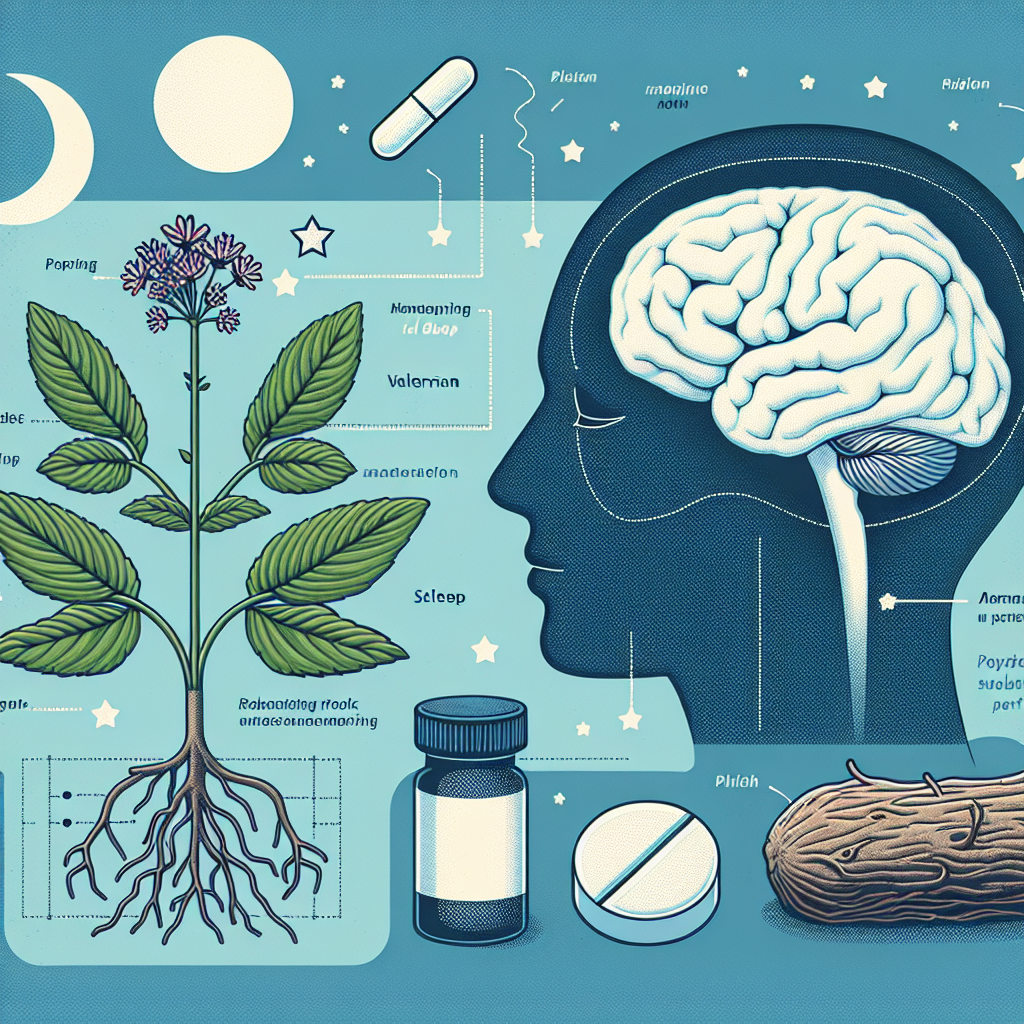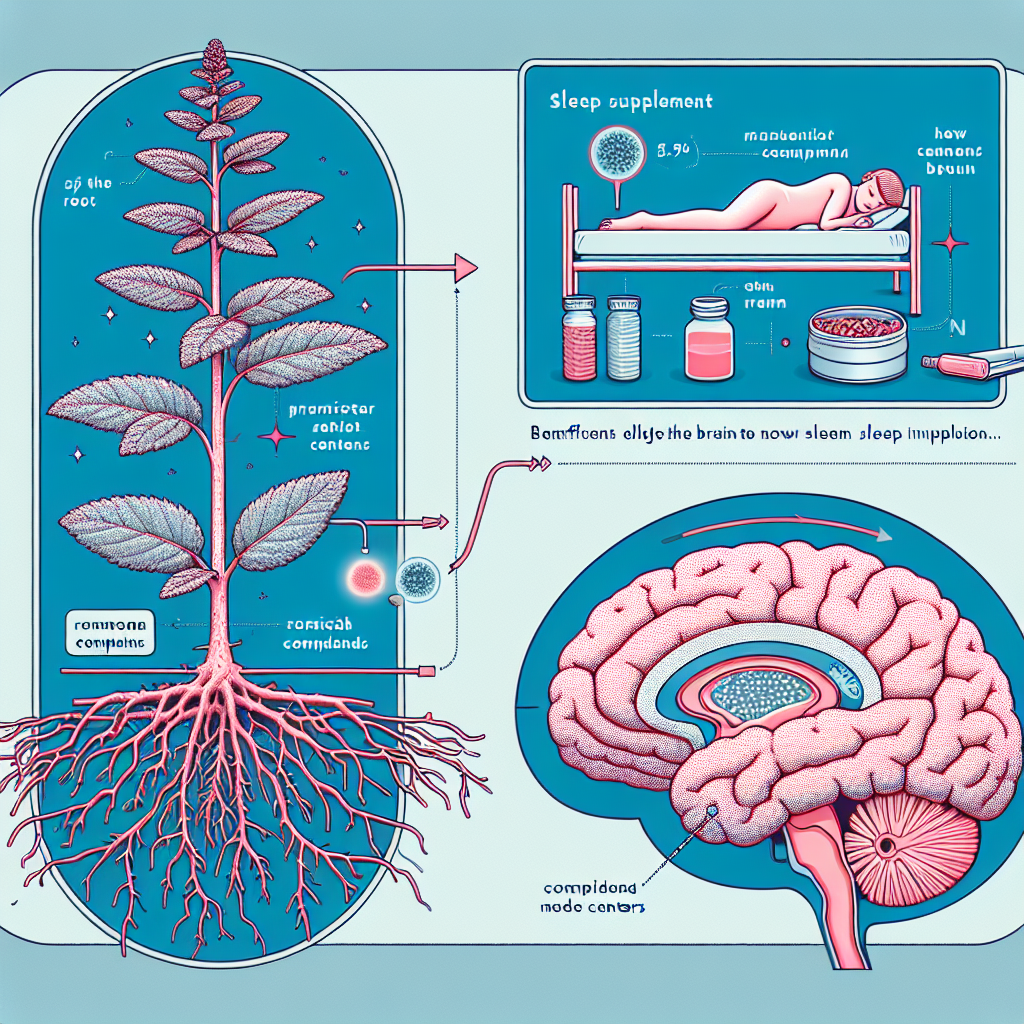The Science Behind Valerian Root as a Sleep Supplement

The Chemistry of Valerian Root: Understanding Its Sedative Properties
Valerian root, a perennial flowering plant native to Europe and Asia, has long been heralded for its sedative properties, making it a popular choice among those struggling with sleep disorders. The science behind valerian root as a sleep supplement is both fascinating and complex, involving a myriad of active compounds that interact with the human body in subtle yet profound ways. This article delves into the chemistry of valerian root, shedding light on how its constituents contribute to its effectiveness as a natural remedy for insomnia and other sleep-related issues.
At the heart of valerian root’s sedative properties lies a diverse array of compounds, including valerenic acid, isovaleric acid, and a variety of antioxidants. Valerenic acid, in particular, plays a pivotal role in enhancing sleep quality. It is believed to interact with the gamma-aminobutyric acid (GABA) system in the brain, a critical pathway involved in regulating nerve impulses. GABA is an inhibitory neurotransmitter, meaning it can decrease the activity of nerve cells, thus promoting relaxation and potentially facilitating the onset of sleep. By increasing GABA levels, valerenic acid helps to calm the nervous system, making it easier for individuals to fall asleep and stay asleep throughout the night.
Isovaleric acid, another key component of valerian root, contributes to its sedative effects through a different mechanism. While its exact role in sleep regulation is not fully understood, isovaleric acid is thought to interact with serotonin receptors in the brain. Serotonin, a neurotransmitter associated with mood and sleep, plays a crucial role in sleep-wake cycles. By modulating serotonin levels, isovaleric acid may help to stabilize mood and improve sleep quality, further enhancing the overall effectiveness of valerian root as a sleep aid.
In addition to valerenic and isovaleric acids, valerian root contains a plethora of antioxidants, including hesperidin and linarin. These compounds are known for their ability to combat oxidative stress, a condition characterized by an imbalance between free radicals and antioxidants in the body. Oxidative stress has been linked to a variety of health issues, including sleep disorders. By neutralizing free radicals, the antioxidants in valerian root may help to reduce oxidative stress, thereby potentially improving sleep quality and duration.
Despite the promising evidence supporting the use of valerian root as a sleep supplement, it is important to approach its use with caution. The effects of valerian root can vary significantly from person to person, and its interactions with other medications have not been fully explored. Therefore, individuals considering valerian root as a natural remedy for sleep issues should consult with a healthcare provider to ensure it is appropriate for their specific situation.
In conclusion, the science behind valerian root’s use as a sleep supplement is rooted in its complex chemistry. The interaction of its active compounds with key neurotransmitter systems in the brain offers a plausible explanation for its sedative effects. While further research is needed to fully understand the mechanisms at play and to optimize its use as a sleep aid, valerian root remains a promising natural alternative for those seeking to improve their sleep quality. As we continue to unravel the mysteries of this ancient remedy, it is clear that the chemistry of valerian root holds the key to its therapeutic potential.
Valerian Root vs. Synthetic Sleep Aids: A Scientific Comparison

Valerian root, a perennial flowering plant native to Europe and Asia, has been used for centuries as a natural remedy to promote relaxation and improve sleep quality. In recent years, the increasing interest in herbal supplements has brought valerian root to the forefront of discussions on natural versus synthetic sleep aids. This article delves into the science behind valerian root as a sleep supplement, comparing its efficacy and safety profile with that of synthetic sleep aids.
The primary mechanism through which valerian root is believed to exert its sedative effects involves the enhancement of gamma-aminobutyric acid (GABA) in the brain. GABA is a neurotransmitter that plays a crucial role in regulating nerve cell excitability throughout the nervous system. By increasing GABA levels, valerian root helps to calm the brain, leading to improved sleep quality. This mechanism is somewhat similar to that of certain synthetic sleep aids, which also target GABA receptors to induce sleep. However, valerian root does so in a gentler, more natural manner, which may explain its lower incidence of side effects compared to its synthetic counterparts.
Research studies have provided mixed results regarding the efficacy of valerian root in improving sleep. Some studies suggest that valerian root can significantly reduce the time it takes to fall asleep and improve the overall quality of sleep. Other research, however, has found only modest or no improvements in sleep parameters among users of valerian root. It’s important to note that the variability in study outcomes could be attributed to differences in the dosage and quality of valerian root used, as well as individual differences in response to the supplement.
In contrast, synthetic sleep aids, such as benzodiazepines and non-benzodiazepine sleep medications, have been consistently shown to be effective in inducing sleep. These medications act quickly to decrease the time it takes to fall asleep and can be highly beneficial for individuals suffering from severe insomnia. However, their efficacy comes at a cost. Synthetic sleep aids are associated with a range of side effects, including daytime drowsiness, dizziness, and a potential for dependence and withdrawal symptoms upon discontinuation. Moreover, long-term use of these medications can lead to tolerance, necessitating higher doses to achieve the same sleep-inducing effect.
When comparing valerian root with synthetic sleep aids, it’s crucial to consider the safety profile of these options. Valerian root is generally well-tolerated, with few reported side effects, which are typically mild and may include headache, dizziness, or gastrointestinal disturbances. Its low risk of dependency and withdrawal symptoms makes it an attractive option for individuals seeking a more natural approach to improving sleep.
In conclusion, while synthetic sleep aids offer a potent and quick solution to sleep disturbances, they come with significant drawbacks, including the risk of side effects and dependency. Valerian root, on the other hand, provides a gentler, potentially safer alternative for enhancing sleep quality. However, individuals considering valerian root as a sleep supplement should be mindful of the variability in its efficacy and consult with a healthcare provider to determine the most appropriate treatment for their specific needs. As the interest in natural remedies continues to grow, further research into the science behind valerian root and its comparison with synthetic sleep aids will be invaluable in guiding informed decisions about sleep management strategies.
The Role of GABA in Valerian Root’s Effectiveness for Sleep Disorders
Title: The Science Behind Valerian Root as a Sleep Supplement
Valerian root, a perennial flowering plant native to Europe and Asia, has long been heralded for its sedative qualities, making it a popular choice among those struggling with sleep disorders. Its use dates back thousands of years, with a rich history of promoting relaxation and improving sleep quality. But what is the science behind this natural remedy, and how does it contribute to better sleep? The key to understanding valerian root’s effectiveness lies in its interaction with gamma-aminobutyric acid (GABA), a crucial neurotransmitter in the regulation of nerve impulses in the nervous system.
GABA plays a pivotal role in reducing neuronal excitability throughout the nervous system. In simpler terms, it acts as a brake on the nervous system’s activity, promoting relaxation and facilitating sleep. Low levels of GABA are often associated with anxiety, stress, and difficulty sleeping, conditions that valerian root has been traditionally used to treat. The connection between valerian root and improved sleep involves the plant’s ability to increase GABA levels in the brain, thereby exerting a calming effect that can help alleviate insomnia and promote restful sleep.
Research into the mechanisms of valerian root has revealed that it contains several compounds that contribute to its sedative effects. Among these, valerenic acid stands out for its ability to inhibit the breakdown of GABA in the brain. This inhibition allows GABA to exert its effects for a longer period, enhancing its calming and sleep-promoting actions. Additionally, valerian root is thought to interact with GABA receptors directly, further increasing GABA activity and contributing to its efficacy as a sleep aid.
The relationship between valerian root and GABA highlights the importance of neurotransmitters in regulating sleep. By modulating the activity of GABA, valerian root helps to balance the nervous system, easing the transition into sleep. This natural approach to enhancing GABA activity offers a compelling alternative to pharmaceutical sleep aids, which often come with a host of side effects and the potential for dependency.
Despite the promising evidence supporting valerian root’s role in improving sleep through its interaction with GABA, it’s important to approach its use with caution. The effectiveness of valerian root can vary from person to person, and its interactions with other medications should be considered. Consulting with a healthcare provider before incorporating valerian root into a sleep regimen is advisable, especially for those with existing health conditions or those taking other medications.
In conclusion, the science behind valerian root as a sleep supplement is rooted in its ability to modulate GABA activity in the brain. By increasing GABA levels and enhancing its calming effects, valerian root offers a natural solution for those seeking relief from sleep disorders. While further research is needed to fully understand its mechanisms and optimize its use, valerian root remains a valuable tool in the quest for better sleep, embodying the intersection of traditional wisdom and modern science in the pursuit of health and well-being.